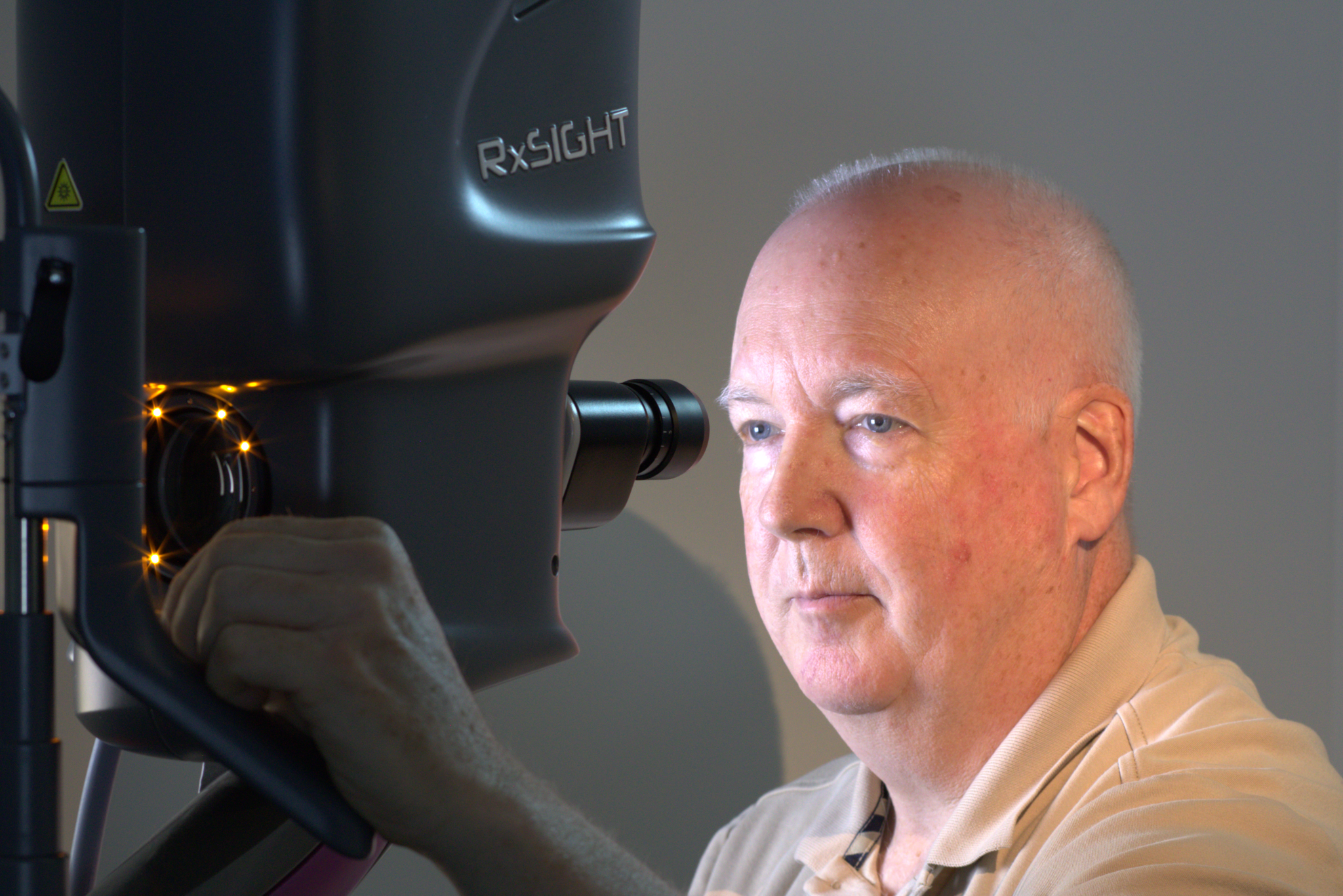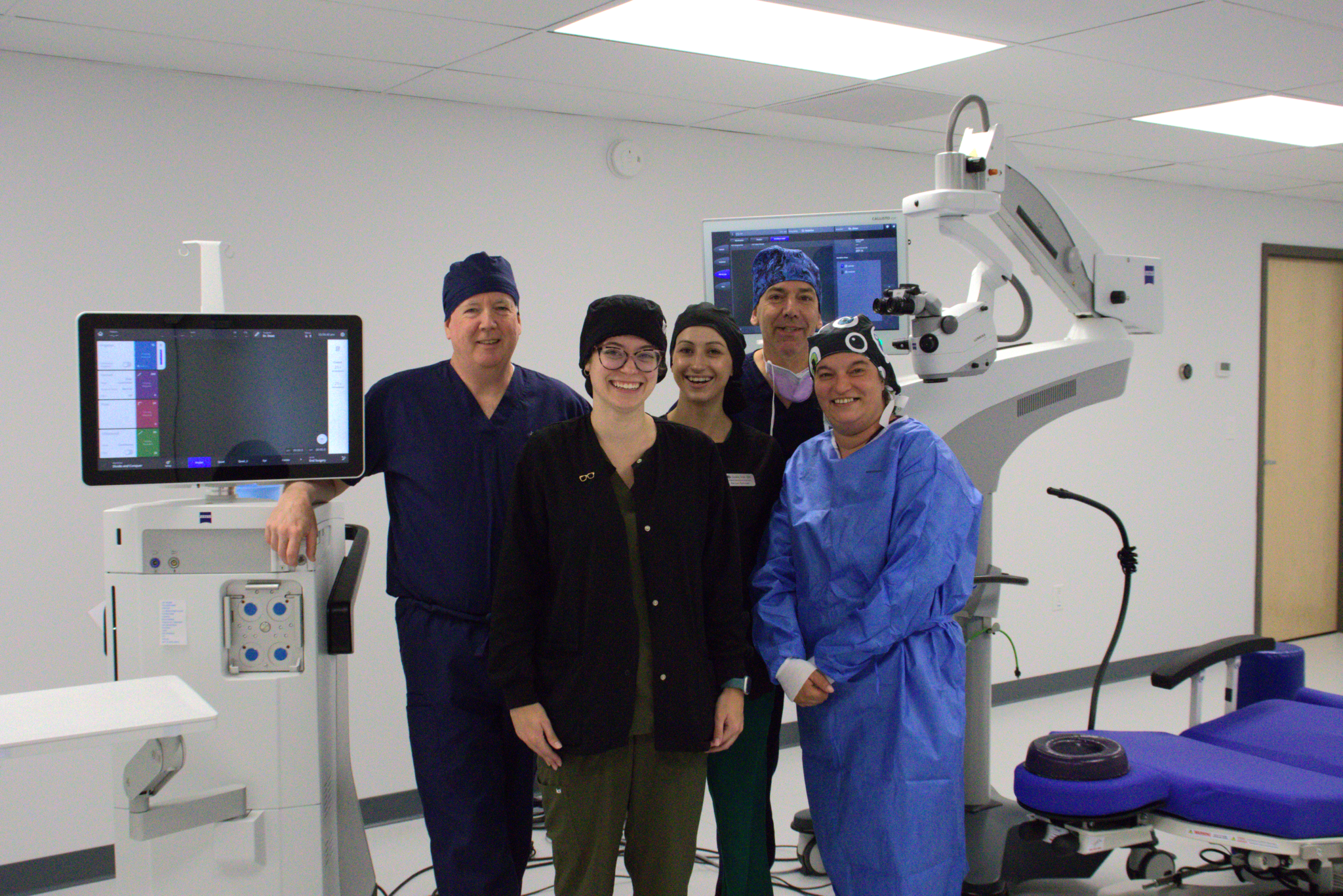Cataracts
Cataracts are one of the most common vision problems affecting adults as they age. These cloudy areas in the eye’s lens can significantly impact your quality of life, making everyday activities like reading, driving, or watching television increasingly challenging.
At Eye Care Northeast, our cataract surgeons are dedicated to helping you regain clear vision and improve your quality of life.
What Are Cataracts?

Cataracts are a common eye condition that develops as you age. Inside your eyes, you have a lens that helps you see clearly.
When you develop cataracts, your lens becomes cloudy, like a foggy window. Cataracts can make vision blurry, dull colors, and make it harder to see at night.
Cataracts typically develop slowly over time. At first, you might not have many obvious symptoms or notice many changes in your vision.
However, as they continue to develop, they can make it increasingly challenging to do everyday tasks like reading, driving, or watching TV.
The good news is that cataracts can be treated through cataract surgery. Cataract Surgery is one of the most common procedures and is a safe and effective way to restore vision.
What Causes Cataracts?
The most common cause of cataracts is the natural aging process. As you age, the lens undergoes changes that cause the proteins inside to break down and clump together.
However, there are other factors that can increase the likelihood of developing cataracts earlier in life. These include not eating enough healthy foods rich in certain vitamins, too much sun exposure without proper eye protection, and eye injury.
Additionally, some people’s genetics may cause them to develop cataracts at an earlier age. At Eye Care Northeast, our eye doctors recommend regular eye exams to detect cataracts early to ensure you are seeing your best.
What Are the Most Common Cataract Symptoms?
If you have cataracts, you may experience:
• Blurred or dim vision
• Increased difficulty with night vision
• Sensitivity to light and glare
• Fading or yellowing of colors
• Frequent changes in eyeglass prescription
• Double vision in the affected eye
These symptoms occur because the clouding of the lens reduces and distorts the light reaching the retina. Sometimes, these symptoms can also indicate other eye conditions.
Regular eye exams are extremely important for early detection and proper diagnosis. If left untreated, cataracts can eventually lead to severe vision loss.
With modern cataract surgery, vision can often be restored quickly and effectively, allowing patients to resume their normal activities with improved vision.
Cataract Symptom Checker






What is Cataract Surgery?
Cataract surgery is a procedure to remove the cloudy lens in your eye and replace it with a clear, artificial intraocular lens, also known as an IOL. Before the procedure, your eye doctor will numb your eye so you will be comfortable.
Then, they will make a tiny incision in the front surface of your eye, so small it usually heals on its own without stitches. Using special tools, the cataract surgeon will break up the cloudy lens into small pieces and remove them.
Then, they will insert and position a new, clear IOL. The procedure typically takes less than an hour, and most people can go home the same day.
At Eye Care Northeast, there are many different types of IOLs available. Depending on which IOL you choose, you may be able to significantly reduce your dependence on visual aids after the procedure.
Your eye doctor will help you choose the best IOL for your needs, budget, and vision goals. After cataract surgery, most people have clearer vision within a few days, noticing improved clarity and vibrancy of colors.
How Do I Know If It’s Time For Cataract Surgery?
Deciding when to have cataract surgery is a personal choice. However, your eye doctor will continue to monitor your cataracts to help you determine when it might be time for cataract surgery.
Some key indicators that it might be time include difficulty with daily tasks due to vision problems. If you’re having trouble reading, watching TV, or driving, it might be time to consider cataract surgery.
Similarly, if poor vision is affecting your work performance or if you’re experiencing more accidents like bumping into things or falling, cataract surgery. Sometimes, eye doctors recommend surgery when cataracts reach a certain stage, even if you’re not experiencing severe symptoms.
Ultimately, if cataracts are significantly impacting your quality of life and stopping you from enjoying your hobbies or social activities, cataract surgery could help you get back to doing the things you love. It’s best to have an open discussion with your eye doctor about your symptoms and concerns to determine the right time for you.
What is The Recovery Process After Cataract Surgery?
Recovering from cataract surgery is usually relatively quick, but it’s important to take care of your eye as it heals. Right after cataract surgery, your vision might be blurry at first.
You’ll need someone to drive you home from the procedure. In the first few days, your eye might feel itchy or uncomfortable. It’s important not to rub them during this stage of healing.

It’s also important that you use your prescribed eye drops to help your eyes heal properly and prevent infection. During the first week after surgery, you will have follow-up appointments at one day and one week post-operatively to monitor how your eye is healing and to check intraocular pressure and your vision.
Most people can resume normal activities the day following surgery. Your vision should continue to improve over the next few weeks.
Throughout your recovery, you’ll need to take some precautions including no bending over for the first 24 hours and in the case of patients with LAL (light adjustable lenses) wearing UV protective eyewear during both the initial recovery and lens adjustment periods (approximately 7-8 weeks post operatively). It is also important to keep water out of your eye when you shower or wash your face for three days after surgery.
It’s also important to avoid swimming or using hot tubs for a few weeks and to wear sunglasses outside to protect your eyes from bright light. Most people heal without any problems, but it’s important to call your eye doctor right away if you experience severe pain, vision loss, or redness in your eye.
Are you experiencing symptoms of cataracts? Schedule a cataract evaluation at Eye Care Northeast in Putnam, CT, today!

